The “twindemics” of the COVID-19 pandemic and enduring structural racism, and subsequent nationwide consciousness, prompted by the widely circulated video of George Floyd’s murder, surfaced our country’s legacies of racist policies and practices and how they are embedded in all aspects of our lives. The protests in the summer of 2020 surrounding the murders of George Floyd, Breonna Taylor, and many other Black bodies sparked leaders across multiple sectors to reassess workplace practices, how White Supremacy Culture shows up, and ways to mitigate its harm. Those mobilizing against structural racism necessarily include nonprofit, community-based, government, and for-profit organizations. Moreover, the work toward advancing Diversity, Equity, and Inclusion (DEI) policies and practices is increasingly rooted in research.
Beloved Community is one such nonprofit leading the charge in incorporating inclusive research as a means to advance equity commitments. A Black woman-founded and led DEI nonprofit organization based in New Orleans, Beloved is inspired by the works, life, and writing of many great Black, Brown, and Indigenous artists, activists, and spiritual leaders such as Martin Luther King, Jr., Audre Lorde, Thich Nhat Hanh, and bell hooks. Beloved Community’s theory of change asserts that “People change systems,” and works exclusively on comprehensive, sustainable solutions for diversity, equity, and inclusion. Founder and CEO Rhonda J. Broussard knew at the outset that the organization needed a balance of real-time change in the lives of youth, workers, and families. Beloved employs three strategies to ensure shared regional goals for economic equity, sustainability, and equitable population distribution in sectors that impact all of us: Equity in Schools, Equity at Work, and Equity at Home. This work includes policy advocacy for equitable education, housing, and workplaces, as well as capacity-building within related institutions so that historically marginalized people have real access and opportunity to live vibrant, productive lives. Rhonda also knew that Beloved would never be able to reach a population-level shift on its own; it would need longer-term commitments such as policy development, and multiyear and longitudinal research. Hence, Beloved’s dedication to creating a research arm to influence inequitable systems more broadly.
This special issue of the Journal of Participatory Research Methods, produced in partnership with Beloved Community, seeks to disrupt notions of how and where research shows up. It invites communities to reclaim research as a tool to advance equity commitments and to fully realize their liberatory potential. This issue’s contributors and editors have both experienced and witnessed the harms of irresponsible research, and/or the way research is dismissed in historically excluded communities They understand the fraught history and usages of data and research. For instance, Rhonda was a secondary teacher for the first part of her career and learned a lot from students about how they experienced research as surveillance. It meant someone–usually someone they didn’t know–sitting in the back of the classroom watching them work and occasionally asking questions. That person rarely returned to the room to share their findings. In her experiences as a university educator and researcher, Faith, Beloved’s inaugural Senior Director of Research and Impact, has observed how so-called community-university ventures often tend to be inequitable and extractive, with researchers gathering data from various communities without sharing important findings or accounting for how research participants themselves might analyze the data. In so doing, well-intentioned research activities and community partnerships reinforce and even exacerbate inequities.
In keeping with the purpose of this journal, the articles featured in this special issue highlight how particular industries or sectors are engaging with participatory techniques, strategies, and methods to address racism in the workplace, higher education, and the research setting to create more equitable, inclusive spaces for everyone. The issue features articles written by practitioners and researchers in the healthcare, nonprofit early childcare, and higher education sectors. The contributing authors believe firmly that how research is produced matters, and their papers prioritize methods, techniques, and processes versus solely findings and outcomes. In the case studies and explorations of antiracist practices included in this issue, there are clear and actionable ideas for others to use in their work.
Chinua Achebe writes about a common West African proverb that “Until the lion learns how to write, every story will glorify the hunter.” Liberatory research disrupts the practice of Othering. The liberatory potential of research is all about agency and creating the conditions for individuals and groups to exercise that agency. Shared voice and shared power are key to making research more accessible and equitable. When researchers exercise shared voice and shared power, they acknowledge that the population/subject at the center of the research has a perspective on the process itself and that they are not just a data point. Shared voice and shared power make space for researchers to invite community members into the process before making all of the decisions about how the research will be conducted. The issue is meant to be a springboard and a guidepost for researchers and practitioners who are searching for antidotes to structural racism and White Supremacy Culture in their research and their work. It is meant to encourage organizational leaders- regardless of sector- to integrate inclusive research methods as a critical component of their equity journeys.
